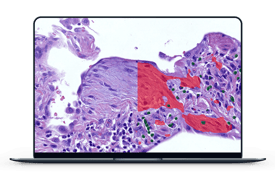Kati Mäkelä, an MD specializing in pulmonary medicine at the Helsinki University Hospital and a PhD student in the Lung Factor Research Group in the University of Helsinki.
Tell us about your research project:
Kati: My doctoral thesis focuses on histopathological features of idiopathic pulmonary fibrosis (IPF) and their connection to clinical information of patients with IPF.
The study cohort of the research project originates from the FinnishIPF registry that is a prospective and multicenter registry study. In this research project, we focused on the prognostic aspects of fibroblast foci, interstitial mononuclear inflammatory cells, and intra-alveolar macrophages in IPF.
We had digitized slides of patients with IPF of which we aimed to quantitate histopathological features and compare their amount against the data derived from the FinnishIPF registry.
At first, we intended to do this manually and partly with semiquantitative methods. Our collaborator, docent and pathologist Mikko Mäyränpää, who had previous experience of Aiforia in other projects, recommended Aiforia.
Aiforia allowed us to quantitate wanted features in absolute numbers instead of using semiquantitative methods.
What did Aiforia allow you to do that you could not do with traditional tools?

The absolute number of inflammatory cells is practically impossible to count manually. In addition, with the layer-based method of Aiforia, we were able to separate interstitial and alveolar inflammatory cells without immunohistochemical staining.
What is the biggest benefit of using AI in your work?
Learning to use Aiforia was fast and easy, and the staff was very friendly and helpful. We found that the numbers of inflammatory cells were associated with prolonged survival of patients with IPF; the finding is novel, and without the use of AI we could not have counted the absolute numbers of inflammatory cells.
Our finding suggests that AI can provide a new kind of approach when analyzing prognostic aspects of histopathological features in IPF, and perhaps in the future, in other interstitial lung disorders as well.
Read Dr. Mäkelä's publication here.